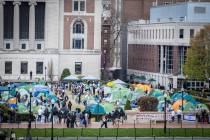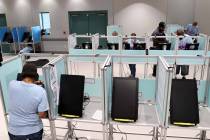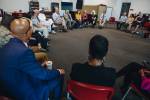UNLV and the pitfalls of globalism
A graphic displayed during the recent broadcast of the NCAA tournament game between UNLV and Kent State caught my attention.
The graphic listed basic facts about each university, including its student population. UNLV's enrollment was listed at 18,000.
This figure was not unfamiliar to me, but with all the March Madness hoopla focused on institutions of higher learning, it was a startling reminder that UNLV isn't really very big. Dozens of public universities around the country have enrollments exceeding 30,000, 40,000, even 50,000.
UNLV is lagging behind despite Clark County having a population exceeding 2 million. In addition, UNLV is the only full-fledged university within at least a 150-mile radius.
Among the many and varied civic challenges facing our community, the low percentage of high school graduates going on to college should be near the top. Yes, some local students go to college out of town, and more power to them. But in general, UNLV's impact on the community is troublingly meager.
One problem, for sure, is that a tight state budget makes it difficult for UNLV to grow. But it's equally true that if the demand were generated, UNLV would find room for more students. Additional students mean additional revenue.
Apparently, the demand isn't there. That may not be entirely UNLV's fault. Or, it could be that UNLV isn't doing enough to attract potential students to the campus.
Sadly, we're not hearing urgent cries of alarm over this state of affairs. In fact, we seem to hear very little at all out of UNLV these days.
That's not to say things aren't happening over on Maryland Parkway. For example, UNLV is considering a plan to create a hospitality education program in the Middle East. This would complement a similar program already operating in Singapore.
I guess if you can't find any students in Las Vegas, you gotta look somewhere.
The first question about opening a branch in the United Arab Emirates is whether the project would be a distraction from educating students here. This, after all, is UNLV's primary mission, and, at least by my count, it's not doing enough to fulfill that mission.
The second issue is similar to the one being asked on college campuses across the country: Can we live with the strings attached to some of these overseas campuses?
Consider the case of Cal Poly San Luis Obispo, which is embroiled in a debate over the university's plan to extend its reach to Saudi Arabia.
There's nothing new about American universities establishing footholds in other countries. It's a popular method to bring in money while state budgets wither, and wealthy Middle Eastern countries represent the new frontier for higher education.
But this new frontier is a philosophical minefield. For example, San Luis Obispo's planned engineering department in Saudi Arabia would be open only to male teachers and students. "No matter how you cut it, we're supporting the oppression of women," Jim LoCascio, a Cal Poly engineering professor, told the Los Angeles Times.
The plan is drawing intense criticism in San Luis Obispo in part because that university has a proud history of educating women in engineering. But questions extend beyond gender. Homosexuality, for example, is a capital crime in Saudi Arabia.
The cultural and ethical pitfalls of the UNLV deal with the United Arab Emirates have not been fully explored, but it would be worth the effort to consider them carefully before making the leap. Would women be able to teach? Would female students be allowed to enroll and take course alongside men? What about Jewish students? Are there religious education requirements that we would be uncomfortable with?
Globalization is the hallmark of the 21st century. Much of this new bridge-building among nations and cultures is fresh and intriguing. But it's not all positive. To offer just one example, Google and Yahoo have made deals with China that allow the government to censor searches conducted through their Web sites. This concession in the name of commerce is inconsistent with American values.
Meanwhile, China's recent crackdown on protests in Tibet has prompted the leaders of some Western nations to ponder boycotting all or part of the upcoming Olympic Games in Beijing.
The respected foreign policy writer Robert Kagan questions whether much-touted "engagement" with China actually will yield more free and democratic governance in that country. He argues that China has a "19th century soul" and has no intention of becoming any less repressive than it is today. "People talk about how pragmatic Chinese rulers are, but like all autocrats what they are most pragmatic about is keeping themselves in power," he writes. In other words, if Google thinks its engagement with China actually will nudge the country toward greater openness, it's dreaming.
In most parts of the Middle East, subjugation of women and religious intolerance are commonplace. Free speech is a fantasy, the poor are exploited and minorities are routinely discriminated against. Yet the lure of oil money has American businesses and universities salivating. What are we willing to sacrifice in the interest of money?
My view is fairly straightforward: We must not sacrifice any of our most cherished values. If non-Westernized countries want to benefit from the scientific or "hospitality" expertise of American universities, we should demand that they accept the whole package: freedom of speech, freedom of religion, gender equality and other well-established human rights. If they want our expertise with untenable conditions, we should politely decline.
Closer to home, the top question is whether UNLV has any business establishing programs abroad when it has unfulfilled goals to achieve here at home. I don't see how UNLV can be satisfied with 18,000 students. As the only public university in a large, fast-growing region, it ought to be focused on strategies to serve a higher percentage of the local population.
Geoff Schumacher (gschumacher@reviewjournal.com) is Stephens Media's director of community publications. He is the author of "Sun, Sin & Suburbia: An Essential History of Modern Las Vegas" and "Howard Hughes: Power, Paranoia & Palace Intrigue." His column appears Sunday.























